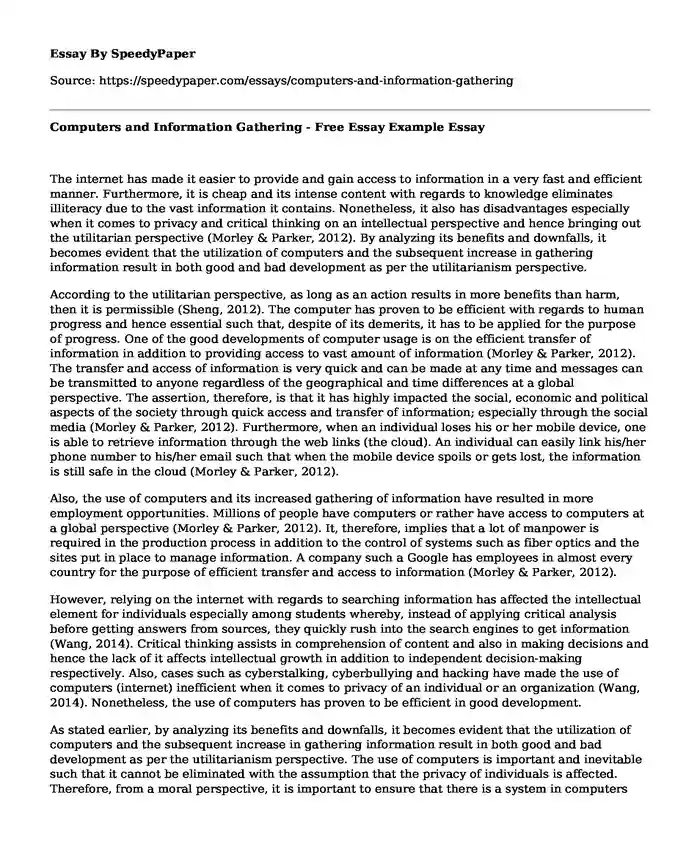
| Type of paper: | Essay |
| Categories: | Internet Computer science Information technologies |
| Pages: | 3 |
| Wordcount: | 644 words |
The internet has made it easier to provide and gain access to information in a very fast and efficient manner. Furthermore, it is cheap and its intense content with regards to knowledge eliminates illiteracy due to the vast information it contains. Nonetheless, it also has disadvantages especially when it comes to privacy and critical thinking on an intellectual perspective and hence bringing out the utilitarian perspective (Morley & Parker, 2012). By analyzing its benefits and downfalls, it becomes evident that the utilization of computers and the subsequent increase in gathering information result in both good and bad development as per the utilitarianism perspective.
According to the utilitarian perspective, as long as an action results in more benefits than harm, then it is permissible (Sheng, 2012). The computer has proven to be efficient with regards to human progress and hence essential such that, despite of its demerits, it has to be applied for the purpose of progress. One of the good developments of computer usage is on the efficient transfer of information in addition to providing access to vast amount of information (Morley & Parker, 2012). The transfer and access of information is very quick and can be made at any time and messages can be transmitted to anyone regardless of the geographical and time differences at a global perspective. The assertion, therefore, is that it has highly impacted the social, economic and political aspects of the society through quick access and transfer of information; especially through the social media (Morley & Parker, 2012). Furthermore, when an individual loses his or her mobile device, one is able to retrieve information through the web links (the cloud). An individual can easily link his/her phone number to his/her email such that when the mobile device spoils or gets lost, the information is still safe in the cloud (Morley & Parker, 2012).
Also, the use of computers and its increased gathering of information have resulted in more employment opportunities. Millions of people have computers or rather have access to computers at a global perspective (Morley & Parker, 2012). It, therefore, implies that a lot of manpower is required in the production process in addition to the control of systems such as fiber optics and the sites put in place to manage information. A company such a Google has employees in almost every country for the purpose of efficient transfer and access to information (Morley & Parker, 2012).
However, relying on the internet with regards to searching information has affected the intellectual element for individuals especially among students whereby, instead of applying critical analysis before getting answers from sources, they quickly rush into the search engines to get information (Wang, 2014). Critical thinking assists in comprehension of content and also in making decisions and hence the lack of it affects intellectual growth in addition to independent decision-making respectively. Also, cases such as cyberstalking, cyberbullying and hacking have made the use of computers (internet) inefficient when it comes to privacy of an individual or an organization (Wang, 2014). Nonetheless, the use of computers has proven to be efficient in good development.
As stated earlier, by analyzing its benefits and downfalls, it becomes evident that the utilization of computers and the subsequent increase in gathering information result in both good and bad development as per the utilitarianism perspective. The use of computers is important and inevitable such that it cannot be eliminated with the assumption that the privacy of individuals is affected. Therefore, from a moral perspective, it is important to ensure that there is a system in computers that prevents interference when it comes to privacy to prevent subjecting harm to an individual.
References
Morley, D. & Parker, C. (2012). Understanding Computers: Today and Tomorrow, Comprehensive. New York: Cengage Brain.
Sheng, C. (2012). A New Approach to Utilitarianism. Dordrecht: Springer Netherlands.
Wang, V. (2014). Handbook of research on education and technology in a changing society. Florida: IGI Global.
Cite this page
Computers and Information Gathering - Free Essay Example. (2019, Oct 21). Retrieved from https://speedypaper.com/essays/computers-and-information-gathering
Request Removal
If you are the original author of this essay and no longer wish to have it published on the SpeedyPaper website, please click below to request its removal:
- Failure Essay Samples
- Free Essay: Philosophical Theories Analysis
- Free Essay Describing Chinese Nationalism
- Land as a Major Theme during American Colonial Period. Free Essay.
- Free Essay: Politics, Political Science and Government
- Repeated Measures, Essay Example from Our Database
- Free Essay Example: Biological Tracking
Popular categories




